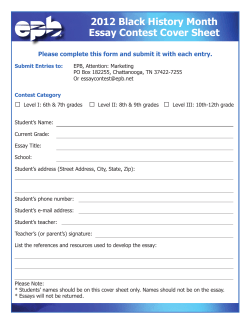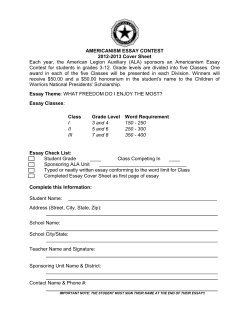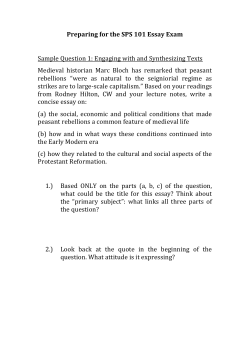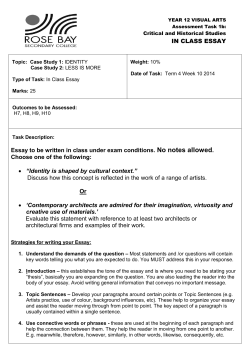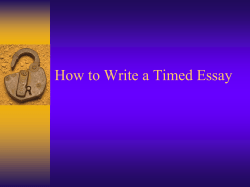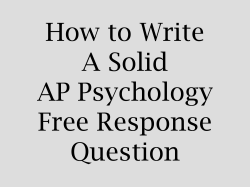
AP English Language and Composition 2014
AP English Language and Composition 2014-2015 Summer Reading Assignment Dear Parents and Students, Welcome to 12 AP English, an intensive course designed to prepare you for the AP English Language and Composition test in May. To get you ready for this test and to help you further develop the thinking and writing skills that will be required of you in college, you will complete a summer reading assignment. Research shows that well-read students have advanced vocabularies and are sensitive to the nuances of language. Furthermore, research strongly suggests that reading, like most skills, improves with practice and decreases when we don’t engage in it for even a short time. To keep your mind active over the summer and create a common foundation on which to begin the class, you will complete these summer assignments. •Summer Text: Thank You for Arguing (nonfiction), by Jay Heinrichs—Read chapters 1-13 and annotate the book (We will use this book all year, so it is important to purchase your own copy). Your annotations will be graded. •College Essay Assignment: Address one of the following prompts in 500-750-words, typed, double-spaced, and include the correct MLA heading. This essay is due on the first day of class (Tuesday, July 29). 1. Tell us why XYZ University is the right place for you, and why you are the right applicant for XYZ University. 2. ABC University wishes to help in “making a difference.” Tell us how YOU hope to make a difference in the world and what role ABC University would play in helping to make that happen. 3. The response of many government officials to domestic terrorism has been to propose increased surveillance of “suspicious” people and organizations. While the public currently supports these restrictions, civil libertarians are becoming increasingly alarmed. Discuss both sides of this debate and state your position on this issue. 4. Evaluate a significant experience, achievement, risk you have taken, or ethical dilemma you have faced and its impact on you. 5. College essay prompt for one of the colleges to which you are applying. ►Remember to KEEP YOUR AUDIENCE AND PURPOSE IN MIND as you write. You are writing for a college admissions board, and you want to be accepted at their school. ►Don’t be BORING. Think about how many essays the college admissions personnel have to read. You don’t want them to pass over your essay because it is typical, ordinary, and boring. Instructions for Annotating (furnishing with critical commentary or explanatory notes) • Underlining: of major points (confusing, interesting, surprising, or important) • Vertical lines at the margin: to emphasize a statement already underlined • Star or asterisk at the margin: to be used sparingly, to emphasize the ten or twenty most important statements in the book • Numbers in the margin: to indicate the sequence of points the author makes in developing a single argument • Writing in the margin, or at the top or bottom of the page: to record questions (and perhaps answers) which a passage raised in your mind • Vocabulary/unusual diction: circle unfamiliar, unusual, or inventive words; write a brief definition or synonym in the margin • Questions: for the instructor to answer, for the class to discuss, for you to use in future writing assignments, or for you to keep as a reminder of what you were thinking • Think: about connections between this text and other texts you have read, information from other classes, and personal experiences • Don’t use a highlighter: Quality marking isn’t done with a fat-tipped highlighter. You can’t write, which is an important part of marking the text, with a large marker. • Don’t mark large volumes of text: You want important points to stand out. If you encounter problems, please feel free to contact us. Have a great summer, and we’ll see you in July! Mrs. Brooke Fuentes—bfuentes@cpcsc.k12.in.us Mrs. Sue Thompson—sthompson@cpcsc.k12.in.us *If you happen to misplace this assignment sheet, you will be able to access it on the WCHS website.
© Copyright 2025
